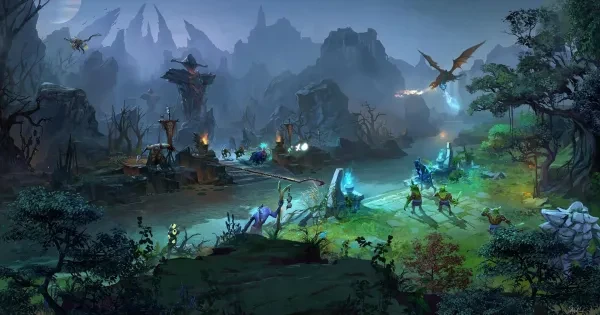Young children In China Restricted to 3 Several hours For each Week for Gaming

Regulators in China are taking their disapproval of youth gaming to the up coming stage with sweeping new constraints that restrict minors to a handful of state-accepted on-line gaming several hours a week.
According to Bloomberg, authorities have purchased gaming platforms these types of as business large Tencent and Netease to limit gaming for slight people to among 8:00 p.m. on Fridays, weekends, and vacations, a dramatic enhance from prior restrictions that limited accounts belonging to minors (those beneath 18) to 1.5 several hours a day. News of the constraints will come by means of Chinese condition-owned media organ Xinhua, which cited the government’s Nationwide Press and Publication Administration.
The new guidelines will require all gaming platforms to be joined to a condition-operated “anti-addiction” system and have to have that all people be verified with a actual-everyday living identification. Regulators also said they will move up compliance checks to be certain organizations implement the new guidelines.
As Ars Technica reported, it is widely understood that the restrictions will apply to all game titles and all units. Nonetheless, the actions appear to predominantly target on the web kinds and it’s not crystal clear how regulators could limit offline gaming even if they intend to. Reuters wrote that many buyers on Chinese social networking site Weibo were being skeptical that young gamers couldn’t conveniently evade the new regulations by these types of implies as the use of parental accounts not matter to the exact same constraints.
Previously, Chinese condition media announced that constraints on online video activity actively playing by minors would be enforced through specifications that platforms put into action facial area recognition units. Theoretically, such a method could be required for all recreation platforms in the potential, furnishing a way to implement age demands in offline online games.
G/O Media may perhaps get a commission
Tencent swiftly moved to roll out a “Midnight Patrol” technique Daniel Ahmad, an analyst at occasional Tencent husband or wife Niko Partners, advised the Verge. The technique labored by figuring out gamers who remained lively following midnight and prompted those who remained on line for extensive quantities of time or used plenty of dollars to submit a photograph of their deal with to validate they have been truly 18 or older.
The NPPA statement in Xinhua characterized the new restrictions as “protecting the actual physical and psychological wellbeing of minors… and relates to the cultivation of the younger technology in the era of nationwide rejuvenation.”
“This ruling is the strictest a person to day and will basically wipe out most spending from minors, which we notice was currently particularly minimal,” Ahmad instructed Bloomberg. Netease inventory slid by more than 9% in pre-marketplace trading in New York, Bloomberg wrote, although UOB Kay Hian (Hong Kong) Ltd govt director Steven Leung explained to the information company that 3 hrs is “too tight” and will “have a negative effects on Tencent far too.”
“I thought regulatory steps would consider a crack progressively, but it’s not stopping at all,” Leung extra. “It will damage the nascent tech rebound for sure.”
“Since 2017, Tencent has explored and utilized different new technologies and features for the defense of minors,” Tencent explained to Bloomberg in a assertion. “That will go on, as Tencent strictly abides by and actively implements the latest requirements from Chinese authorities.”
In accordance to the Wall Road Journal, when extensive numbers of youthful men and women play on the internet video games in China, gaming organizations might very easily be equipped to climate the storm due to the fact those people users comprise a small proportion of total earnings. Tencent explained to the paper just 2.6% of its gross receipts in China arrived from gamers underneath the age of 16 from April to June, although the paper noted it was the company’s slowest quarter for growth because 2019.
This yr, regulators in China have consistently cracked down on the country’s tech sector, seemingly both of those in response to the exact sort of antitrust, monopoly, and competitiveness fears that have been powering a backlash to tech firms in the U.S. and simply because their speedy growth generates area for dissent or other pursuits the Communist Occasion of China deems socially dangerous.
Authorities have particularly singled out video clip online games, with Reuters citing just one point out outlet as contacting them “spiritual opium” and leading officers regularly railing in opposition to a perceived epidemic of video clip match habit. At the very least one particular dependancy center in Beijing has made use of a boot camp-fashion design to treat internet addiction, whilst Chinese authorities vowed in 2017 to control other people that at times subjected youngsters to electric powered shocks. Tencent has reportedly thought of banning small children beneath 12 from gaming fully. Steam, the biggest recreation distribution company in the earth, proceeds to be available from China through VPN but recently introduced a Chinese edition of the provider with a seriously minimal selection of games and restricted social networking functions.
Online video online games aren’t the only focus on. Authorities have investigated nearby officers on suspicion of graft to support corporations like Chinese e-commerce big Alibaba and some others, blocked a merger between Tencent and competitor Douya, and ordered tech corporations to limit the use of algorithms in their solutions in favor of human curation.





